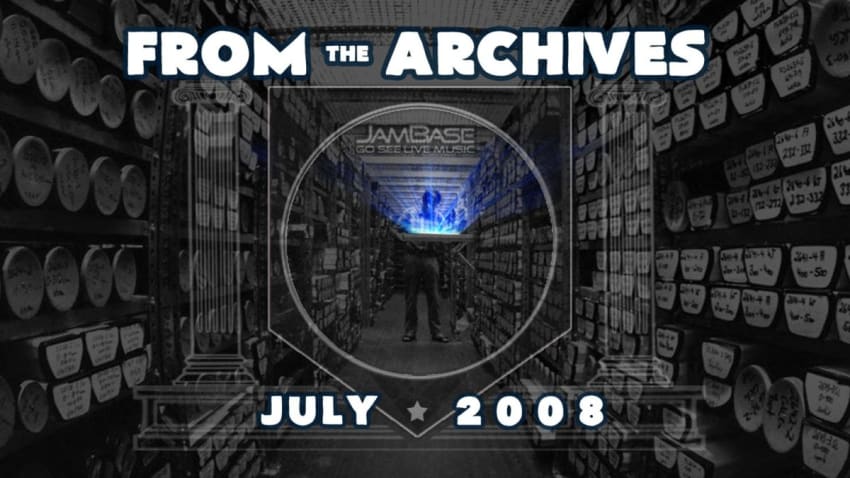Blindsided by Bon Iver
By Team JamBase Jul 8, 2008 • 7:00 pm PDT

This my excavation and today is kumran
Everything that happens is from now on
This is pouring rain
This is paralyzed
This is not the sound of a new man or crispy realization
It’s the sound of the unlocking and the lift away
Your love will be
Safe with me
 |
For Emma knocks you back on your heels from the first listen. There’s something fully fleshed about it, a human density to Vernon’s compact marvel. In just 37 minutes, one feels they’ve experienced a profound moment – many of them really – in a person’s life, and the lack of specificity, the sheer poetry of the storytelling allows these moments to seep into the listener’s life, providing beautifully refracted perspectives on the heart and soul, a new set of keys for unlocking one’s own experiences. In much the same way as a gifted film director, we enter a place that hums with strange verisimilitude, an individual set of truths that expands naturally into something far more universal.
 |
There’s something a little scary in the aloneness at the center of this album, something unsettling and exciting about the honesty set down on tape
“That’s the magic of music for me. What you put into it is what you get out of it. I think aesthetically and artistically I’ve always operated on this level – and I’m not just saying this because the record is out there in the world and doing well – but nothing I’ve done to this point has felt this complete. But it’s hard to kind of quantify,” says Vernon. “I always feel like an asshole when I try to describe it [laughs]. Maybe I should do a better job of not letting it be so folky or whatever so it isn’t described in that way. I’m not just sitting here trying to make music that’s been made before.”
 |
Continue reading for more on Bon Iver…
 |
|
 |
There are folk skeletons to some cuts. For example, “The Wolves (Act I And II)” could easily be a mournful bluegrass tune in other hands. It’s how Vernon has dressed things up – or stripped them down in some cases – that differentiates his work from the coffee house set. There’s an unpremeditated, organic character to the album that eludes easy categorization.
“I think people sometimes jump to conclusions about what a song’s gonna be before it’s done, and that shouldn’t happen in the recording studio,” says Vernon. “It’s hard to do because the audience gives you bread but you can’t shape it around that because that’s not what people really want at the end of the day.”
Vernon played almost every instrument and sang every note, facing the challenge of hearing how things harmonize and second guessing the insertion of piano or some other sonic element. The final product is remarkably consonant, a feel that pervades without ever settling into one groove.
“The reason I do it like that is almost to save myself the worry of boring someone else. I’m an alright musician but most of the time I’m picking up an instrument and trying to do something on it I’m not capable of. So, it’s a long process to figure out what I want to play and then be able to play it with the phrasing and quality I want to hear it at. It’s a very repetitive process. I wouldn’t even call them ‘takes’ because I’m usually not sure what it is I’m playing,” laughs Vernon. “One of the reasons I like working alone is because if somebody else is there I might skip through things because I feel bad they have to sit through this process. It’s carving away and finding out what’s in your subconscious. Rather than perfect one style of instrument I guess I just wait until the songs dictate what I want to do, and then battle each part as it comes.”
The subconscious is an important aspect of For Emma, which taps into things we can’t usually access consciously.
 |
Taking this one-man, dearly private production into the live setting with a full band has actually proven to be a pleasurable experience for Vernon.
“It’s fun because the guys understand me. Mike [Noyce] has known me for a long time – I was his [guitar] teacher – and Sean [Carey] has listened to my music for a few years. They aren’t hired guns or anything but they recognize [the album] is a very concise statement, that everything that was there needed to be there,” observes Vernon. “So, what we’re trying to do is just delicately unwrap the layers of the songs, maybe exposing new directions of the songs as we play them live. They unfold in, dare I say, more masculine versions [laughs]. They take the same care I do in approaching unwrapping these extra layers of skin. It’s very nice.”
Bon Iver – Skinny Love (Live at Later… with Jools Holland
JamBase | Eau Claire
Go See Live Music!
